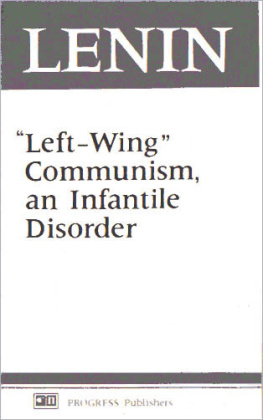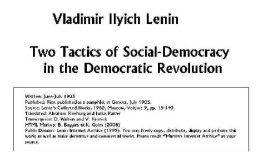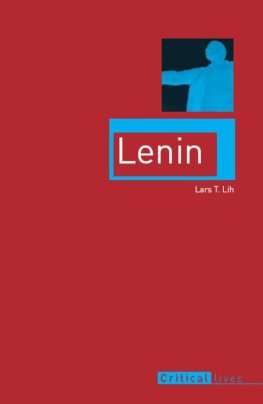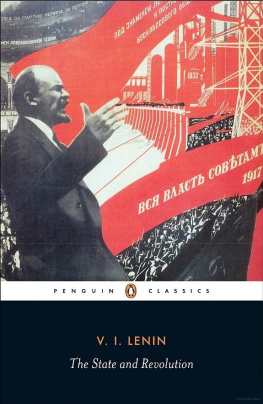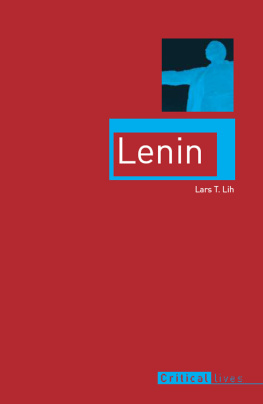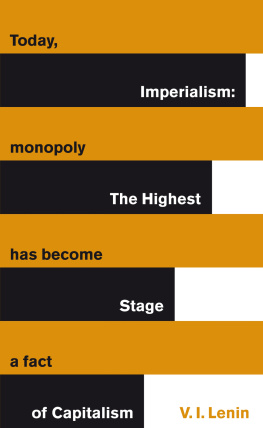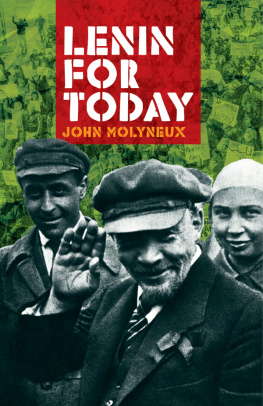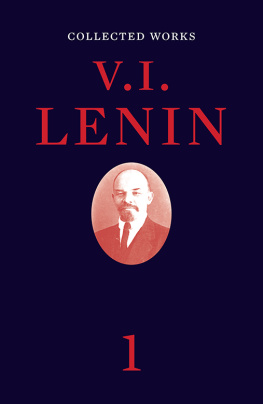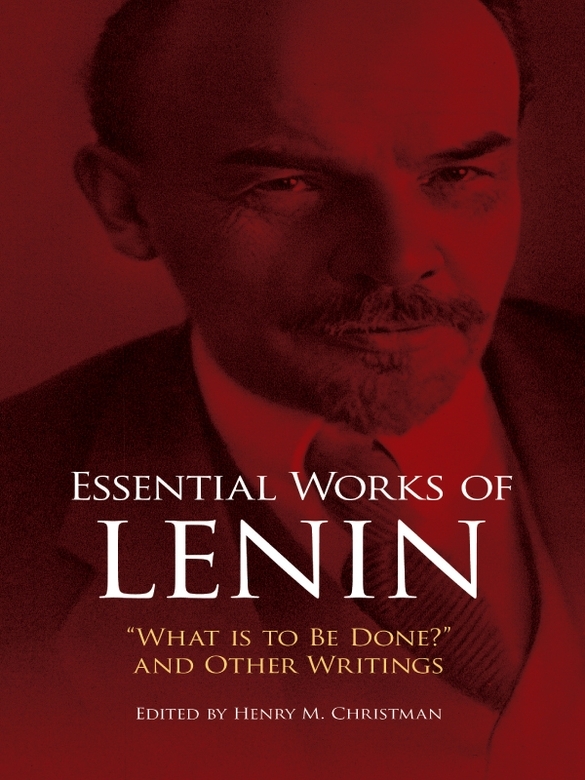For those who wish to pursue the subject of Lenins philosophy of communism in theory and action, obviously the study of Lenins other works will be valuable. For those who wish to follow other paths of inquiry, the following suggestions may be of use.
For a biographical study of Lenin: The Life of Lenin, by Louis Fischer. Or, for those who desire a brief biographical introduction, with many excellent illustrations: Lenin, by Nina Gourfinkel.
For an over-all view of Russian history: A History of Russia, by Bernard Pares, generally accepted as the standard one-volume survey. And, for a more extensive study of Soviet Russia, History of Soviet Russia, by Edward Hallett Carr. Any reading in Russian history, by the way, would be greatly aided by having at hand for ready reference A Concise Encyclopaedia of Russia, by S. V. Utechin.
For an engrossing study of communism within the context of modern history and culture: To the Finland Station, by Edmund Wilson. And, for a more extensive study of communism and socialism: History of Socialist Thought, by G. D. H. Cole. And for the background of communism in the United States: The Roots of American Communism, by Theodore Draper.
BIOGRAPHICAL INDEX
AXELROD, PAVEL (1850-1928), an associate of Plekhanov in the latters transition from populism to Marxism in the 1880s, a leading member of Plekhanovs circle of Marxist thinkers. and subsequently a prominent Menshevik opponent of Lenin.
BEBEL, AUGUST (1840-1913), a leader of the German Social Democratic Party and a member of its parliamentary delegation in the Reichstag.
BELINSKY, VISSARION (1810-1848), early spokesman of the non-noble radical intellectuals in Russia and originator of a sociological school of literary criticism.
BERNSTEIN, EDUARD (1850-1932), a leading theoretician of the German Social Democratic Party, rejected Marxist concepts of class struggle and inevitable world revolution, originated revisionist theory of evolutionary socialism.
BISSOLATI-BERGAMASCHI, LEONIDA (1857-1920), a founding member of the Italian Socialist Party in 1892, editor of the socialist newspaper, Avanti!, and founder of the Reformist Socialist Party in 1912.
BRANTING, KARL (1860-1925), socialist journalist and editor, founding leader of the Swedish Social Democratic Party in 1889, first Social Democrat elected to the Riksdag in 1896, first Social Democratic Premier of Sweden, 1920, and again Premier 1921-23 and 1924-25, awarded the Nobel Peace Prize in 1921.
BUKHARIN, NIKOLAI (1888-1938), Bolshevik leader, headed the Left Communists in opposition to Lenin in 1918, but maintained good personal relations with Lenin, and was co-author with him of the Communist platform adopted in 1919. Following Lenins death, Bukharin supported Stalin against Trotsky, and became head of the Politburo in 1925. Leader of the Right Opposition against Stalin in 1928-29, he was dismissed from his major posts; subsequently, he became a prominent defendant in a show trial during Stalins Great Purge in March, 1938, and was executed.
CHERNYSHEVSKY, NIKOLAI (1828-1889), Russian literary critic and theoretician of revolutionary populism, significant forerunner of Bolshevik thought.
DHRING, EUGEN (1833-1921), German philosopher and economist who advocated the retention of capitalism in a reformed version with a strong labor movement.
FOURIER, CHARLES (1772-1837), French social philosopher and leading utopian socialist, originated the doctrine of a social utopia organized in phalanxes, the inspiration for Brook Farm and other Fourierist communities in the United States.
GUESDE, JULES (1845-1922), French socialist active in the Paris Commune of 1871, and subsequently a spokesman for Marxism within the French Left.
HENDERSON, ARTHUR (1863-1935), several times chairman of the British Labour Party, entered House of Commons in 1903, member of the coalition government during World War I, Foreign Secretary in the second ministry of Ramsay MacDonald, 1929-31, awarded the Nobel Peace Prize in 1934.
HERZEN, ALEKSANDR (1812-1870), Russian social philosopher and journalist, lived abroad after 1847, founded the first Russian migr press, attacked tsarist autocracy and advocated humanitarian, democratic socialism.
HOBSON, JOHN ATKINSON (1858-1940), British economist, criticized classical theories of economics and asserted that economic theory should promote social reform.
KAUTSKY, KARL (1854-1938), prominent socialist theoretician, literary executor of Marx and Engels, leader of the German Social Democratic Party, founder of the Independent Social Democratic Party in Germany, and leading spokesman of the Second International. He developed an independent theory of Marxism which rejected both Leninist Bolshevism and Bernstein Revisionism.
KROPOTKIN, PRINCE PETER (1842-1921), geographer and revolutionary anarchist, a Russian nobleman who renounced his title, was imprisoned in both Russia and France, lived in exile in Britain, returned to Russia following the Bolshevik Revolution. He consistently advocated Communist Anarchism, and opposed state power in any form.
LASSALLE, FERDINAND (1825-1864), German socialist leader, probably the most famous nineteenth-century German socialist next to Marx and Engels, laid the foundation for the German Social Democratic Party. He differed with Marx on the role of the state, seeing the state as a prospective instrument for social reform, and advocated a state system of workers cooperatives.
LIEBKNECHT, KARL (1871-1919), son of a founder of the German Social Democratic Party, Wilhelm Liebknecht (1826-1900), the younger Liebknecht was, like his father, a prominent Social Democratic member of the Reichstag. Karl Liebknecht refused to support the German government in World War I, bolted the German Social Democratic Party and founded the Spartacus Party, forerunner of the German Communist Party. Together with Rosa Luxemburg, he led the unsuccessful Spartacist revolt of 1919 against the moderate Social Democratic government of the Weimar Republic; both were killed in the uprising.
MARTOV, YULI (1873-1923), pseudonym of Yuli Tsederbaum, a revolutionary colleague of Lenin who broke with him in 1903 and became a leading Menshevik theoretician, left Russia in 1920 and went into exile.
MIKHAILOVSKY, NIKOLAI (1842-1904), Russian literary critic, pioneering sociologist, and leading theoretician of legal populism.
MILLERAND, ALEXANDRE (1859-1943), French socialist leader best known as the first socialist to become a cabinet member in a liberal, non-socialist bourgeois government.
PLEKHANOV, GEORGIY (1857-1918), Russian intellectual often referred to as the father of Russian Marxism, he supported Lenin up to and through the Russian Social Democratic congress of 1903, but subsequently joined the Mensheviks.
PROUDHON, PIERRE JOSEPH (1809-1865), French social philosopher, best known for his work, What Is Property?, a vigorous criticism of the abuses of private property.
RADEK, KARL (1885-?), Russian socialist who, like Lenin, refused to support any government during World War I, joined Bolsheviks at time of Bolshevik Revolution, subsequently active in Soviet affairs, purged by Stalin.
SAINT-SIMON, CLAUDE HENRI DE ROUVROY, COMTE DE (1760-1825), French social philosopher and utopian socialist.
SCHEIDEMANN, PHILIPP (1865-1939), German socialist journalist and editor, entered Reichstag in 1903, became secretary of the German Social Democratic Party, entered coalition government in 1918, was minister in and later head of the 1919 republican government following abdication of Kaiser Wilhelm, fled Nazis and died in exile in Denmark.


